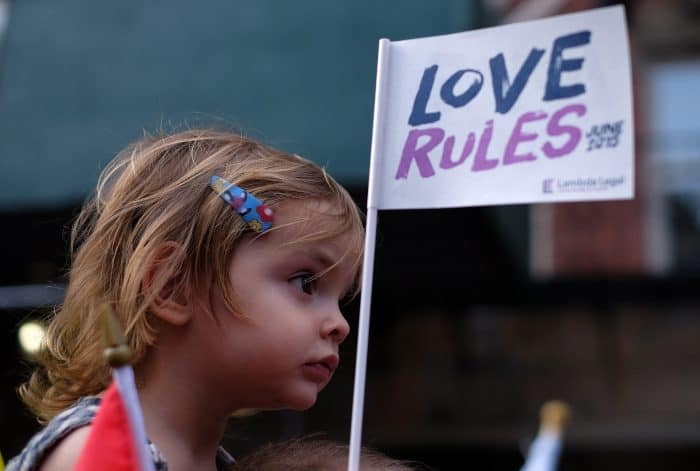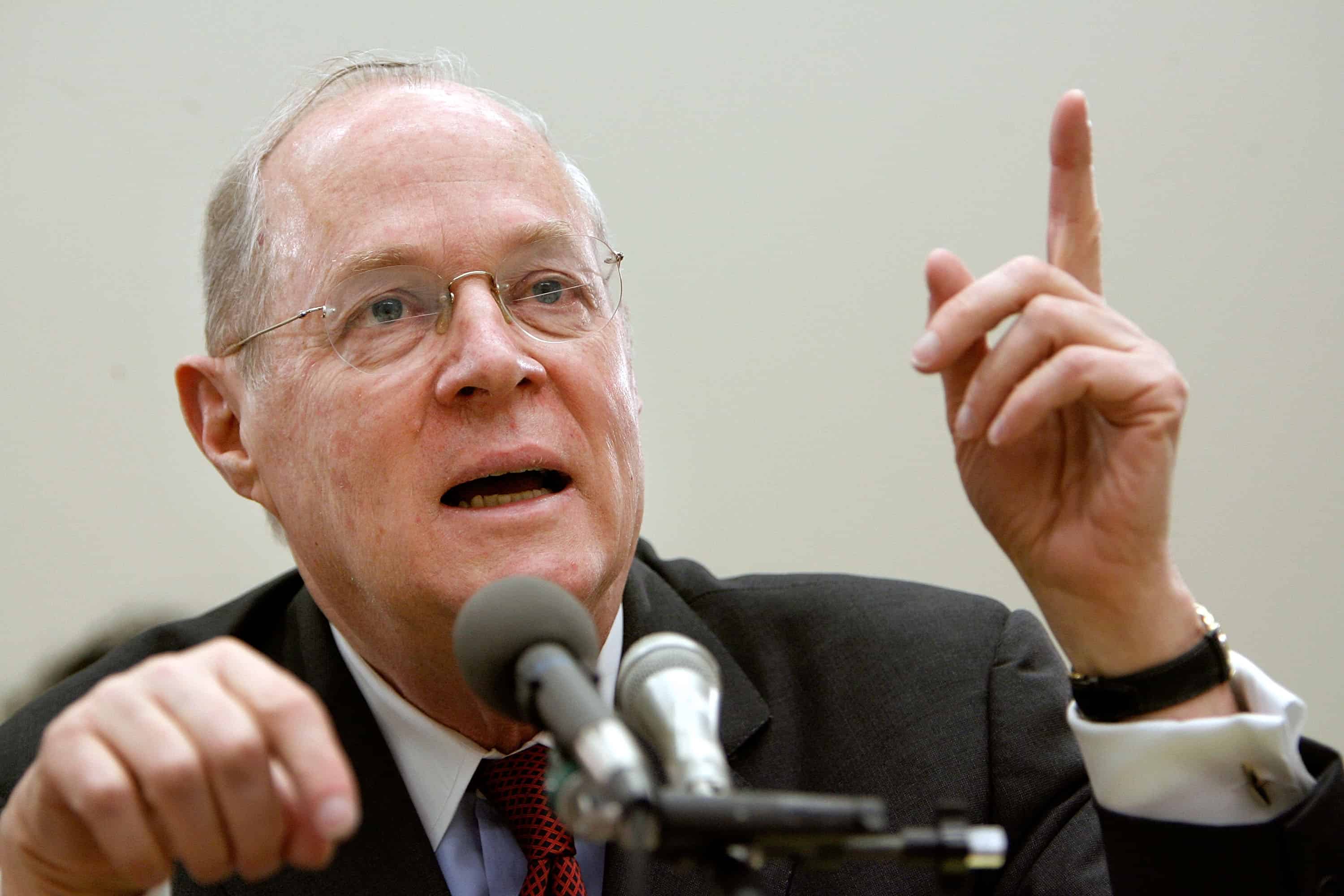WASHINGTON, D. C. – Justice Anthony Kennedy was opposed by gay rights groups when he was chosen for the U.S. Supreme Court, but on Friday he cemented his legacy as the court’s most influential champion for their cause.
Kennedy, 78, who was Ronald Reagan’s third choice for his third nomination to the high court, wrote the majority opinion in the landmark decision Friday concluding that the Constitution requires that same-sex couples be allowed to marry.
It is the latest ruling in which Kennedy has emerged as both the unparalleled and unlikely hero for gay rights, writing each of the Supreme Court’s groundbreaking opinions on the subject.
In 1996, it was a decision that said states could not restrict localities from protecting gays against discrimination. In 2003, he led the court in overturning laws criminalizing homosexual conduct. He wrote the court’s 2013 decision in United States v. Windsor that said the federal government must recognize gay marriages performed where they are legal.
Kennedy capped that run of rulings with the court’s 5-to-4 decision Friday in Obergefell v. Hodges, writing that “the reasons marriage is fundamental under the Constitution apply with equal force to same-sex couples.”
There was a time when gay rights activists would never have expected such language from Kennedy. As executive director of the Gay and Lesbian Task Force, Jeffrey Levi testified against the confirmation of Kennedy, a lawyer and judge from Sacramento, California, to the Supreme Court in 1988.
The reason was simple, Levi said. As a judge, Kennedy “had voted wrong (on gay rights issues) each time he had the chance. That was the basis for our opposition. . . .
“Obviously there is an evolution here that was not something any of us could have predicted,” said Levi, now a professor of health policy and management at George Washington University. “But I think it is reflective of the dramatic change that has happened in American society.”
Evolution is a word that comes up often in describing Kennedy.
One of his former clerks, Cornell law professor Michael Dorf, wrote on his blog Friday that there has been much speculation about Kennedy’s “absence of animus for gay people.”
Some have attributed it to Kennedy’s formative years as a “California Republican,” less concerned with social conservatism than other members of his party. Others wonder about his close friendship with a law school dean in Sacramento that many say was in the closet.
But Dorf said: “It’s also fair to say that the process of evolution that he describes the nation undergoing over the last four decades was also a personal process.”
“I think it a fair bet that as recently as 2003, when he authored Lawrence v. Texas, Justice Kennedy did not think [as Justice Antonin Scalia warned and as the Massachusetts Supreme Judicial Court would soon say] that the opinion entailed a right to same-sex marriage.”
In the Lawrence decision, Kennedy struck down a Texas law that criminalized homosexual conduct and penned one of his most famous lines on the subject of tolerance.
“Times can blind us to certain truths and later generations can see that laws once thought necessary and proper in fact serve only to oppress,” he wrote.
In that case, he was overturning a contrary decision reached by the Supreme Court 17 years earlier, Bowers v. Hardwick, in which the justices had upheld criminal laws against homosexual conduct. Kennedy was unapologetic: “Bowers was not correct when it was decided, and it is not correct today. It ought not to remain binding precedent.”

Earlier, he had written for the majority in Romer v. Evans, striking down a Colorado constitutional amendment that precluded cities from adopting laws protecting gays from discrimination in housing, employment and other areas.
The amendment, Kennedy wrote, “classifies homosexuals not to further a proper legislative end but to make them unequal to everyone else. This Colorado cannot do. A state cannot so deem a class of persons a stranger to its laws.”
Two years ago, in Windsor, Kennedy emphasized “dignity” in denouncing the federal government’s refusal to offer the same government benefits available to heterosexual couples to legally married gay couples. Such actions tell “all the world that their otherwise valid marriages are unworthy” and “humiliates” their children.
He returned to that theme in Friday’s ruling. Denying same-sex couples the right to marry, he said, “would disparage their choices and diminish their personhood.”
In the latest opinion, Kennedy described the plaintiffs in gentle, almost loving terms.
“Their hope is not to be condemned to live in loneliness, excluded from one of civilization’s oldest institutions,” Kennedy wrote. “They ask for equal dignity in the eyes of the law. The Constitution grants them that right.”
Kennedy’s fellow Reagan nominee, Scalia, has also been his longtime adversary on judicial pronouncements that overturn voter-passed limitations on gay rights. Scalia argues that Kennedy’s judicial views on the issue are nothing more than opinions on public policy that under the Constitution must be left to voters or their elected officials, not judges.
Scalia also seemed driven to distraction by Kennedy’s prose. Scalia said he would rather “hide my head in a bag” than join an opinion that began as Kennedy’s Obergefell decision did, and compared Kennedy’s writing with the “mystical aphorisms of the fortune cookie.”
But their differences are more fundamental than that. Scalia and other conservatives on the court look backward to history and traditions to see if a ban on same-sex marriage is constitutional.
Allison Orr Larsen, a law professor at the College of William and Mary, has explained that to Kennedy, “binding ourselves to a static sense of liberty is too stifling and unfaithful to the nature of a charter document like a Constitution that is meant to last forever.”
While Kennedy is now a hero to gay rights advocates, his opinions are too eclectic to make him a reliable champion for either the left or the right.
Reagan’s compromise candidate — the president said Kennedy “seems to be popular with many senators of varying political persuasions” in announcing his selection — votes most often with conservatives.
But his broad view of judicial power and specific stands — for gay rights, limiting the death penalty, his refusal to overturn Roe v. Wade — infuriate many on the right.
Liberals find him an unmovable foe on issues such as campaign finance restrictions and affirmative action. He authored the decision upholding the federal Partial-Birth Abortion Ban Act.
Kennedy is known at the court as unfailingly polite and his profile so low that he strolls the Supreme Court grounds unrecognized by tourists. He has not achieved the fandom afforded Scalia on the right or Justice Ruth Bader Ginsburg on the left.
But at a recent appearance, Ginsburg was thanked by someone in the audience for the court’s decisions on gay rights and same-sex marriage.
She demurred. “That’s Tony Kennedy,” she said.
© 2015, The Washington Post






